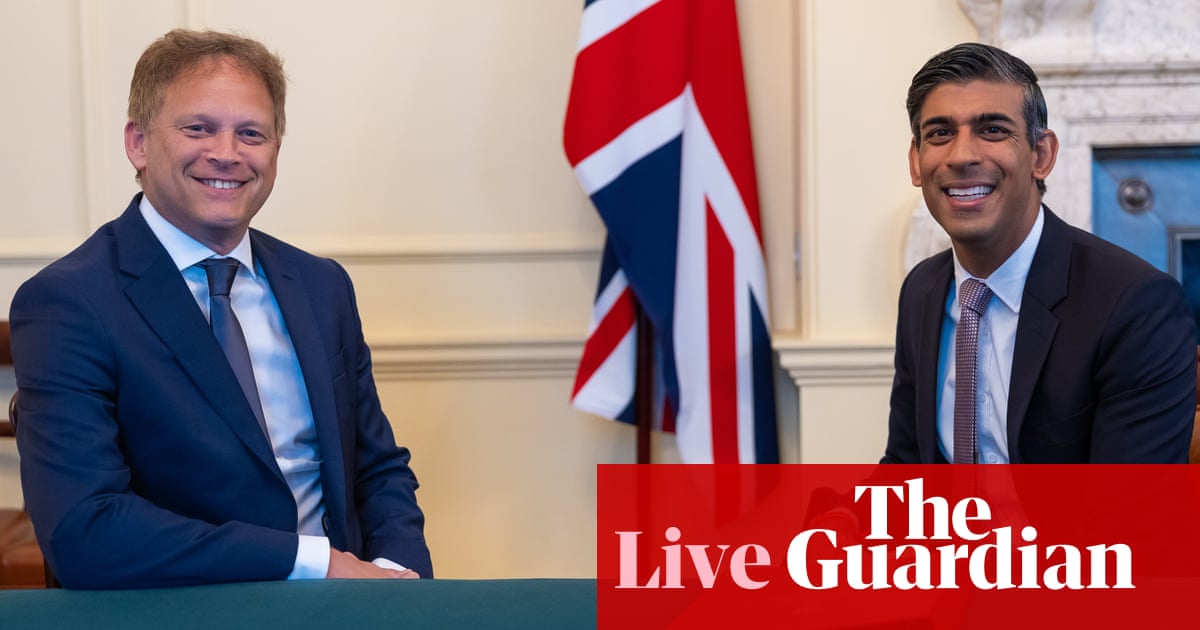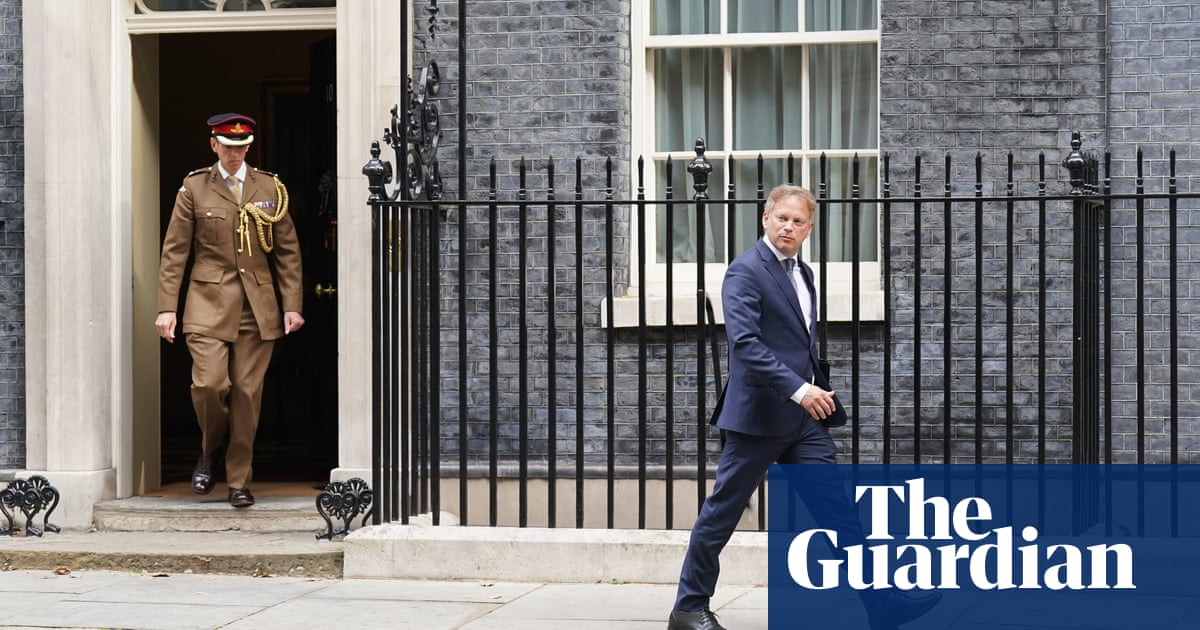
Grant Shapps confirmed as new defence secretary
Grant Shapps has been confirmed as the new defence secretary, after Ben Wallace’s resignation earlier today.
The prime minister, Rishi Sunak, has moved quickly to appoint Shapps, who most recently served in the cabinet as the energy security secretary.
He has previously served as the home secretary (for six days in Liz Truss’s ill-fated cabinet), business secretary, transport secretary and chairman of the Tory party, among a number of junior ministerial roles since 2010.
Wallace had served for just over two years before stepping down this morning, ahead of an expected mini reshuffle.
Closing summary
Here is a round-up of the day’s main headlines:
Ben Wallace resigned as defence secretary, having announced his intention to quit the cabinet earlier this summer. Wallace confirmed in a letter to the prime minister, Rishi Sunak, on Thursday morning he was standing down to “invest in the parts of life that I have neglected, and to explore new opportunities”.
Grant Shapps was confirmed as the new defence secretary, after Wallace’s resignation. The prime minister, Rishi Sunak, moved quickly to appoint Shapps, who most recently served in the cabinet as the energy security secretary. He has previously served as the home secretary (for six days in Liz Truss’s ill-fated cabinet), business secretary, transport secretary and chairman of the Tory party, among a number of junior ministerial roles since 2010.
Shapps knows “very little about defence” and it will take him “quite some time to get up to speed”, a former chief of the general staff of the British Army has said. Lord Dannatt told Sky News Ben Wallace “did a good job, but he leaves with work in progress”, adding: “And now we have a new defence secretary who knows very little about defence, and it’s a complex portfolio. It will take him quite some time to get up to speed. I think there is a risk that certainly the debate on resources for defence stagnates, at least until Grant Shapps can get his head around his portfolio.”
Rishi Sunak appointed Claire Coutinho as secretary of state for energy security and net zero, No 10 has announced. Coutinho, who was elected as the MP for East Surrey in 2019, had previously served in the cabinet as an education minister.
The Tory MP David Johnston was appointed parliamentary under-secretary of state at the Department for Education, replacing the promoted Claire Coutinho. Johnston, who was first elected in December 2019 and represents Wantage, takes on the vacated role in Rishi Sunak’s mini reshuffle.
The NHS is bracing itself for a winter of industrial unrest after junior doctors in England voted to continue strike action until next spring as part of their campaign for a 35% pay rise. Junior doctors voted 98.4% in favour of staging walkouts until early 2024 unless the government increases their salaries in order to end the dispute.
Thousands of pupils in England may have to begin the autumn term taking lessons remotely after the government ordered more than 100 schools to immediately shut buildings made with aerated concrete until safety work is undertaken. The guidance from the Department for Education was sent to 156 schools and colleges just days before the start of the new school year. It stated that regardless of the assessed risk of a building made using reinforced autoclaved aerated concrete (RAAC) blocks, they should be “taken out of use and mitigations should be implemented immediately”.
The Labour party has spent more £500,000 as part of its lawsuit against five former staffers accused of leaking an internal report on antisemitism, the Guardian understands. The £508,000 spent so far follows a bitter battle between Labour and ex-staff members, including Jeremy Corbyn’s former chief of staff Karie Murphy and his former director of communications Seumas Milne. The total includes £300,000 spent on a failed application to gain access to Murphy’s private emails. The party has been refused permission to appeal.
Labour has suspended one of its most troubled constituency parties after alleged rule-breaking in the run-up to the next general election, the Guardian can reveal. The Leicester East constituency Labour party (CLP), which has been represented by the disgraced parliamentarians Keith Vaz and Claudia Webbe, is the subject of an internal investigation by the party’s headquarters, senior sources have confirmed.
The head of the RSPB has apologised after the wildlife charity called Rishi Sunak and other ministers “liars” in a social media post. Beccy Speight, the chief executive of the Royal Society for the Protection of Birds, said she did not approve the post on X, formerly known as Twitter, that said the UK prime minister, the levelling-up secretary, Michael Gove, and the environment secretary, Thérèse Coffey, were liars.
Labour and the Conservatives have been accused of being out of step with public concern about the cost-of-living crisis, as polling suggested fewer than one in four people believed tackling it was a priority for the two parties. Swing voters from key demographics – “Workington man” and “Stevenage woman”, the monikers that campaign strategists have given to groups they are targeting – appear sceptical about the parties’ proposals to ease cost pressures. Labour was viewed as significantly better placed to tackle the crisis, by 40% to the Conservatives’ 21%. But only 23% and 21% of voters respectively believed tackling it was a priority for the two parties.
The Scottish Labour leader, Anas Sarwar, has accused the UK government of “playing politics” in relation to drug consumption rooms, which allow people struggling with addiction to safely take drugs under supervision. A report from the home affairs committee at Westminster published on Thursday backed proposals for drug consumption rooms staffed by medical professionals to offer treatment services.
Nadhim Zahawi is in line to become chair of the Daily Telegraph and the Sunday Telegraph after brokering a deal between Middle Eastern investors and the Barclay family, according to reports. The Barclays are thought to be attempting to regain control of the media group with financial support from investors in the United Arab Emirates, months after surrendering the debt-laden business to Lloyds Banking Group.
The former British chancellor Kwasi Kwarteng is due to start advising Fortescue on its clean energy ambitions from October – one year after his disastrous mini-budget crashed the pound. Kwarteng, who was sacked last year by then prime minister Liz Truss after only 38 days as chancellor, will provide advice in a part-time capacity to Fortescue’s emerging clean energy division.
And finally, the release of the book written by Nadine Dorries on the downfall of Boris Johnson will be delayed slightly, publisher HarperCollins has confirmed. The former MP’s book, titled The Plot: The Political Assassination Of Boris Johnson, had been scheduled to be released on 28 September, just before the Conservative party conference. It will now be released on 9 November, PA Media reports.
That’s all from me, Tom Ambrose, and indeed the UK politics live blog for today. Thanks for following along.
Junior doctors in England vote to continue strikes through winter
The NHS is bracing itself for a winter of industrial unrest after junior doctors in England voted to continue strike action until next spring as part of their campaign for a 35% pay rise.
Junior doctors voted 98.4% in favour of staging walkouts until early 2024 unless the government increases their salaries in order to end the dispute.
The result means hospitals and other health services will face disruption for at least several more months because consultants (senior doctors) are also striking over pay. The NHS has had to cancel almost 1m appointments and operations because of industrial action by staff groups including nurses since last December.
The former Tory MP Antoinette Sandbach has threatened the University of Cambridge with legal action after a historian named her as a descendant of merchants who enslaved his ancestors.
Malik Al Nasir, a third-year PhD history student at St Catharine’s College, has spent the past 20 years exploring his family’s history of slavery and the wealth that was built from those who enslaved them.
He discovered his ancestors were enslaved in plantations in the former colony of British Guiana (now known as Guyana) during the 18th and 19th centuries.
Al Nasir claims a substantial amount of the wealth from plantation slavery was brought to Liverpool by Samuel Sandbach and his business partners – the same city Al Nasir grew up in.
Al Nasir claims he has been pressed to remove a reference in his work to Antoinette Sandbach, a former MP for Eddisbury in Cheshire, who is a descendant of Samuel Sandbach and beneficiary of his estate.
Sandbach has said she supports and appreciates the importance of Al Nasir’s work but raised concerns that she was being singled out in an online Ted talk given by him.
The Guardian understands Sandbach’s lawyers have threatened to sue the University of Cambridge over the Ted talk.
Thousands of pupils may have to start term online as over 100 schools affected by crumble-risk concrete
Thousands of pupils in England may have to begin the autumn term taking lessons remotely after the government ordered more than 100 schools to immediately shut buildings made with aerated concrete until safety work is undertaken.
The guidance from the Department for Education was sent to 156 schools and colleges just days before the start of the new school year.
It stated that regardless of the assessed risk of a building made using reinforced autoclaved aerated concrete (RAAC) blocks, they should be “taken out of use and mitigations should be implemented immediately”.
Schools were told “this may come as a shock and is likely to cause disruption” but the guidance goes on to say “the safety of pupils, students and staff is our priority”.
In anything up to around two dozen schools, the amount of RAAC involved means students and teachers will need to be moved off site to temporary accommodation.
The mitigations can include shoring up the structure with supports, moving students to other parts of the school or, in some cases, setting up portable buildings in playgrounds.
While this will be paid for by the DfE, it could involve students having to take lessons from home for anything from a few days to up to two weeks.
Unison, which represents more than 200,000 non-academic school staff, said the situation was “nothing short of a scandal”.
The former British chancellor Kwasi Kwarteng is due to start advising Fortescue on its clean energy ambitions from October – one year after his disastrous mini-budget crashed the pound.
Kwarteng, who was sacked last year by the then prime minister, Liz Truss, after only 38 days as chancellor, will provide advice in a part-time capacity to Fortescue’s emerging clean energy division.
The former business and energy secretary has expressed support for a shift from gas to renewables, hydrogen use, and energy efficiency upgrades, such as housing insulation.
Kwarteng’s removal as chancellor and departure from the official residence at 11 Downing Street opened the way for outside roles after a 12-month waiting period.
Labour and the Conservatives have been accused of being out of step with public concern about the cost-of-living crisis, as polling suggested fewer than one in four people believed tackling it was a priority for the two parties.
Swing voters from key demographics – “Workington man” and “Stevenage woman”, the monikers that campaign strategists have given to groups they are targeting – appear sceptical about the parties’ proposals to ease cost pressures.
Labour was viewed as significantly better placed to tackle the crisis, by 40% to the Conservatives’ 21%. But only 23% and 21% of voters respectively believed tackling it was a priority for the two parties.
Stop the Squeeze, a coalition of pressure groups, said the findings suggested Keir Starmer and Rishi Sunak should adopt bolder solutions.
The head of the RSPB has apologised after the wildlife charity called Rishi Sunak and other ministers “liars” in a social media post.
Beccy Speight, the chief executive of the Royal Society for the Protection of Birds, said she did not approve the post on X, formerly known as Twitter, that said the UK prime minister, the levelling-up secretary, Michael Gove, and the environment secretary, Thérèse Coffey, were liars.
The tweet continued: “You said you wouldn’t weaken environmental protections. And yet that’s just what you are doing. You lie, and you lie, and you lie again.”
On Thursday morning, Speight told BBC Radio 4’s Today programme:
There are lots of things happening at the moment and one of them is this proposal from the government to amend the habitat regulations, to disapply the requirements for nutrient neutrality.
The reason that has made us so frustrated and led to that original tweet is that it completely goes against the commitments that the government has made many times in the past not to weaken environmental protections, most recently when the retained EU law bill was going through in the summer.
So, this completely contravenes those commitments and that’s what’s led us to be so frustrated and so angry about the proposed amendment coming through.
The reason that we issued our apology is that we do believe that the nature of public discourse does matter and that we have a role to play in that, and that we campaign on policy, not on people.
So, the framing of that tweet, where we called out individual people, we felt was incorrect and inappropriate, and we apologise for that.
The Scottish Labour leader, Anas Sarwar, has accused the UK government of “playing politics” in relation to drug consumption rooms, which allow people struggling with addiction to safely take drugs under supervision.
A report from the home affairs committee at Westminster published on Thursday backed proposals for drug consumption rooms staffed by medical professionals to offer treatment services.
A possible facility has been discussed in Glasgow for years, but requires an exemption to the Misuse of Drugs Act from the Home Office to go forward.
If the UK government is not willing to support such a move, the committee said, the relevant powers should be devolved to Holyrood.
Sarwar said the Scottish government could move ahead with consumption facilities now. He said:
I think there is a way forward here that allows us to pilot safe consumption rooms in Glasgow and other parts of the country that does not require the devolution of our drug laws.
It requires – as the lord advocate has already highlighted – a change in terms of how you would have a presumption against prosecution.
I think that is a much more co-operative way forward if we are serious about tackling the issue. One drug death is one drug death too many.
To have the highest drug deaths anywhere in western Europe, anywhere in the UK is utterly unacceptable. I’m sick and tired of politicians wanting to play politics with these people’s lives rather than help save these people’s lives.
Responding to the report, a spokesperson for the Home Office said:
There is no safe way to take illegal drugs, which devastate lives, ruin families and damage communities, and we have no plans to consider this.
Our 10-year drugs strategy set out ambitious plans, backed with a record £3bn funding over three years, to tackle the supply of illicit drugs through relentless policing action and building a world-class system of treatment and recovery to turn people’s lives around and prevent crime.
Under the committee’s recommendations, Glasgow would operate a pilot of the facilities that could then be expanded across the UK, funded by government north and south of the border.
A former chief of the general staff of the British army said that questions remained about what sort of defence secretary Grant Shapps would be.
Speaking to BBC Radio 4’s World at One programme, Lord Dannatt said:
The big question is whether he’s going to be a politician first and foremost, or whether he’s going to be looking after the defence needs of the country.
If Rishi Sunak has appointed Grant Shapps to be a supporter in cabinet, to go quietly on defence, and to be a smooth voice on Radio 4 as we run-up to the election, that’s one thing.
But if he’s going to properly understand the needs of defence, as Ben Wallace has pointed out in his resignation letter and over the four years that he was secretary of state of defence, we do need to spend more money on our defence.
Is Grant Shapps going to fight their corner in cabinet or is he going to come quietly and play the political game?
The senior Tory MP Tobias Ellwood has backed the new defence secretary, Grant Shapps, to succeed in the role.
The chair of the Commons defence committee told BBC Radio 4’s World at One programme he was speaking in a personal capacity as he rejected concerns about Shapps’ knowledge of military matters.
He said:
He’s a very competent and capable minister. He understands the Whitehall machine. He’s actually one of the best communicators that is in the cabinet at the moment.
He sits on, or has sat on, the national security council as well. He’s a pilot, so very familiar with the air domain too and indeed was coincidentally in Ukraine, in Kyiv, last week talking about nuclear power and other aspects too, so very familiar with what’s going on.
I don’t need to remind everybody that he will be surrounded by one of the most professional civil service machines in the world.
Nadhim Zahawi is in line to become chair of the Daily Telegraph and the Sunday Telegraph after brokering a deal between Middle Eastern investors and the Barclay family, according to reports.
The Barclays are thought to be attempting to regain control of the media group with financial support from investors in the United Arab Emirates, months after surrendering the debt-laden business to Lloyds Banking Group.
Lloyds Banking Group put the Telegraph’s holding company into receivership in June after the breakdown of talks with the family.
On Thursday, the Times reported that the MP and former chancellor had been involved as a “middle man” in the financing deal, raising the prospect of Zahawi becoming chair of the titles if the Barclays are successful in buying back around £1bn of debt owed to Lloyds.
Labour costs pass £500,000 in lawsuit over leaked antisemitism report
The Labour party has spent more than half a million pounds as part of its lawsuit against five former staffers accused of leaking an internal report on antisemitism, the Guardian understands.
The £508,000 spent so far follows a bitter battle between Labour and ex-staff members, including Jeremy Corbyn’s former chief of staff Karie Murphy and his former director of communications Seumas Milne.
The total includes £300,000 spent on a failed application to gain access to Murphy’s private emails. The party has been refused permission to appeal.
In a high court order handed down this month, Mr Justice Chamberlain ordered the party to pay £90,000 as an interim contribution towards Murphy’s costs. Murphy, Milne and the three others – Georgie Robertson, Laura Murray and Harry Hayball – deny leaking the report by Labour’s governance and legal unit in April 2020.
In a tweet, the new energy secretary, Claire Coutinho, said she is “delighted” to be appointed to the post.
“I will work with the Prime Minister to safeguard our energy security, reduce bills for families, and build cleaner, cheaper, homegrown energy,” she wrote.
Early-years sector criticises latest departure from children and families brief
Claire Coutinho’s promotion to energy security and net zero secretary means she is just the latest minister to depart the children and families brief in recent years.
The prime minister has already appointed David Johnston as her replacement at the Department for Education but the reshuffle has not been well received within the sector.
Neil Leitch, the chief executive of the Early Years Alliance, said:
While we congratulate Claire Coutinho on her promotion, the fact that the early years will soon be on its tenth minister in as many years is beyond frustrating for the sector.
The fact that government expects providers to put up with a never-ending revolving door of ministers is bad enough, but to do so as the sector prepares to roll out its biggest early years expansion in recent history is bordering on negligent.
What we need more than ever over the coming months is consistent policy, driven by ministers who have a clear understanding of the early years sector and the challenges it faces. This reshuffle is likely to deliver the exact opposite.
Purnima Tanuku, the chief executive of National Day Nurseries Association, said:
With the news of the sudden departure of Claire Coutinho from the childcare brief, we are back to square one. This is really distressing for the early years sector to have their minister moved at such a crucial time just seven months from the expansion of funded childcare for two-year-olds.
The new minister David Johnston will be the eighth we have had within five years. Childcare and early education must be a priority and must be given some stability and focus.
Mr Johnston will need to get to grips very quickly with the key financial and workforce challenges plaguing the sector in order to make this expansion a success for children, parents and providers. With his background in the Social Mobility Commission and Education select committee, we hope he will hit the ground running and work closely with the sector to support them to give children the best start in life.
Since her appointment as education minister, Claire Coutinho has engaged well with the sector and its challenges, speaking at our conference and visiting many nurseries. We wish her well in her new role.












